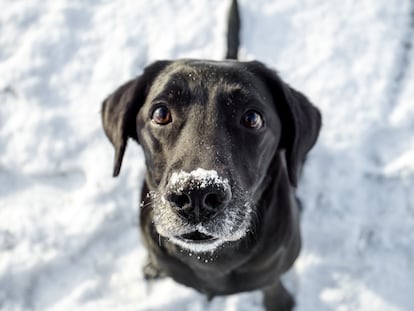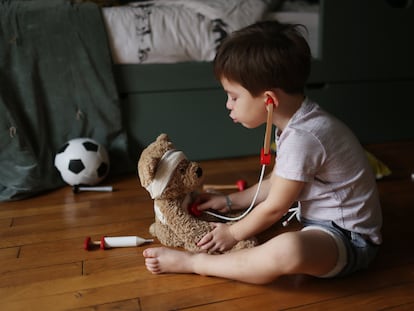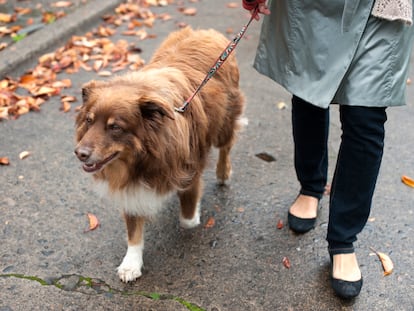
How to teach your kids the value of the truth
Parents shouldn’t lie to their children, or punish them for being honest

Parents shouldn’t lie to their children, or punish them for being honest

The cognitive ability of animals is determined by factors such as genetics and experiences. But education has the greatest influence, so it’s important to provide them with stimuli appropriate to their species

Nightmares and pleasant experiences are part of the dream repertoire of animals, whose sleep patterns resemble those of humans. Restful sleep is equally essential for their health and plays a crucial role in enhancing their learning abilities

The emotional state of these animals is determined by their environment, training, genetics, experiences and personality, but some of the factors that affect them the most are loneliness and illness

Stings, heatstroke, poisoning and dehydration are some of the dangers pets face during the warmest months of the year. Preventing possible dangers and basic first aid are key

Parents experience chronic stress because they neglect themselves, leading to long-lasting dissatisfaction, exhaustion and emotional distancing

There are several signs that a dog has developed hypersensitivity to pollen or certain foods. Spotting and identifying allergens early guarantees the animal’s wellbeing and improves its quality of life

Canines lose muscle mass as they get older, have lower resistance to infections, and can develop osteoarthritis. To ensure their quality of life, they should eat an age-specific diet, exercise moderately and stay well hydrated

Felines tend to get along best with similarly sized species, because when guided by hunter’s instincts, they will perceive smaller pets, like rodents or birds, as prey. To avoid problems at home, make sure their first encounters with new roommates are stress-free

Dogs experience dreams and nightmares where they recall waking moments, often provoking body movements and sounds during sleep

Too much fast food can lead to obesity and cardiovascular problems; encouraging healthy eating habits from a young age is crucial

Domestic cats are the only felines that purr when interacting with humans, a form of communication that can express happiness, pain or hunger

Dogs catch colds and need to increase their body temperature during the winter, so as to avoid respiratory problems such as kennel cough. Specific clothing for going outside and keeping them at home at an adequate temperature are ways to protect them when the thermometer drops

Felines’ singularities are a reflection of their dietary needs, such as wet food made specifically for them and their preference for drinking running water. If they don’t eat well, they can develop kidney or liver problems

A lack of affection can lead children to constantly search for approval, as well as make them insecure and rebellious. The key to avoid this is to spend quality time with them

Fleas and ticks don’t just endanger the health of animals; they threaten people’s health as well. Knowing how to eliminate them properly and preventive measures like collars or pipettes are an essential part of pet care

Dogs developed this form of vocal expression as a way of adapting to the human environment; to interpret it, one has to take into account their body language and the context

Young people should sleep nine hours a day without interruption because they are in full hormonal effervescence and metabolic change. However, most do not do so and have a poor quality night’s rest, leading to consequences such as headaches and decreased attention span

Felines are famously low-maintenance, but that does not mean that anything goes. Here’s what you should (and shouldn’t) do to ensure their happiness and well-being

Genetics, obesity, respiratory diseases or environmental issues, such as passive smoking, influence whether a child snores, a problem that affects their quality of rest and their daily lives

Young dogs learn to eliminate outdoors when they’re around six months old. During the training process, reward them, establish a routine of walking hours and never punish or reprimand them if they do it wrong

Nervousness and pulling on the harness are some of the difficulties that can arise when taking pets outside. According to experts, choosing the right leash and letting canines sniff around are two keys for avoiding these situations

The fastest dogs on the planet are sleepy, loyal, and homely. All they need to be happy and healthy is a few minutes a day to release their energy and a soft, warm place to rest

Canines and felines reach senescence at different ages according to their breed. Signs include gray fur and loss of vision and hearing. In addition to veterinary checkups. Moderate exercise and a specific diet help them to preserve their quality of life

While a dog believes that its owner is a god and provides everything he needs, a cat thinks that he is a god and has his owner for everything he needs. Even so, with the right approach, felines can be taught some basic behavioral guidelines

With these recreational activities, youngsters can develop empathy, organizational skills and teamwork. The classics, such as chess and ludo, are great options

A sense of humor and learning-centered approach are crucial for fostering healthy competitiveness in sports and games